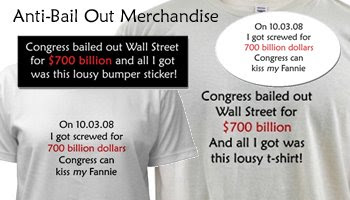 Photo by RepublicDomain.com
Photo by RepublicDomain.com1. Bailing Out GM, Ford, and Chrysler would be morally wrong.
The proper role of a government is to maintain a civil society, meaning a society free from aggression, a society in which no human being can threaten any other by aggressing against them to destroy, diminish, or expropriate their lives, or their liberty or property- which are necessary preconditions of and corollaries to a human being's right to his or her own life. When government forcibly takes from some in the form of exorbitant taxes (or inflation) to give to others, it does the very thing it exists to safeguard against happening. When it takes such an action, it becomes an aggressor. It ceases to be an impartial arbiter between free and equal citizens to ensure their liberty, and it becomes a biased, partisan advocate for some people, using the legal power and force of its laws to favor them at the expense of the lives, liberty, and property of others without their consent and voluntary cooperation, which is morally outrageous.
2. Cash flow problems aren't fixed by more cash.
If water is draining out of a container, you don't fix the problem by pouring more water in- it'll just drain out like the rest of the water. If the government wants to give more money to "the Big Three," it might as well just throw the money in a hole and burn it. This is the reason why many lottery winners are notorious for blowing through their millions of dollars in winnings, because no matter how much money they win, if they spend more than they make, they're going to start losing money until it's all gone. Likewise, no matter how much money we give to these companies, as long as they're posting major losses each month, they're just going to lose it all until it's all gone.
3. The idea that government can attach conditions to the money that will solve the cash flow problems themselves is misguided and wrong.
When a group of automobile industry executives who are intimately acquainted with the particulars of their own industry are apparently not able to return a profit on their operations, it is downright absurd to think that a group of politicians (who are hardly exemplars of efficient spending or financial management themselves) can dictate operational policies that will return profits from these auto companies. Additionally, if the "Big Three" automakers get the cash they want by agreeing to Congress' conditions, when their companies continue to lose money, they'll a have great excuse for American taxpayers to fork over more money to them. They'll say, "We followed your guidelines and lost money. Now it's your fault and you have an obligation to bail us out again."
4. It's either worth it to bail them out, or it's not.
By "worth it" I mean that it is either economically worthwhile to invest capital in these companies, or else it is not. They either create value, or they don't. If they are economically worthwhile to invest in, then private investors looking to return a profit will invest in these companies. They will do so on a private and voluntary basis of mutual consent for mutual benefit (i.e. they will do so on a moral and civilized basis, which is proper to human beings). If this is the case, then government does not need to bail them out; private capitalists will give them the financing they need to stay in business. If, on the other hand, it is not economically worthwhile to bail them out- if they do not create value and are not worth it, then why on earth would the government do so? It would be a waste of money. So if either one of the two possible alternatives is true, government should not bail out these auto companies.
5. Trying to save people's jobs is not a valid justification for subsidizing mediocrity and mismanagement.
While the desire to prevent people from going through the pain and stress of losing a job is a natural one and springs from a healthy, caring disposition towards other people, it is not a moral blank check or a justification to use whatever means to accomplish that end. For all the reasons given above, regardless of anyone's best intentions, implementing this policy would be morally wrong and practically disastrous. If we save some people's jobs (for now) with such a policy, we can then drive their cars straight to an economic hell on the road we paved with all those good intentions. On a more practical level, letting the market operate is the best thing to do for people working at these struggling companies. It will help redirect their work to stable jobs at more productive, value-creating alternatives. Last century, when people decided that automobiles were better than horses and buggies, manufacturers of buggy whips likely lost a ton of business and had to lay off a ton of workers. Should the government have bailed out the buggy whip industry to save the workers the pain and stress of losing their jobs? No! Did the world fall to pieces when the government didn't? No. Did people find more productive jobs making better money at companies that created more value for everyone? Yes. Was it actually a good thing that buggy whip companies lost business and jobs? Absolutely.
6. There are other non-statist, non-immoral, non-insane solutions to help "the Big Three."
Congress doesn't even seem to consider that less legislation might do more to help ailing companies than more of the same. Their solution is passing more laws instead of repealing the bad ones that got us here in the first place. What could Congress do to help these struggling auto companies without spending the rest of our money? They could try repealing all the expensive and unnecessary laws and regulations that cost these companies millions in compliance costs. They could try lowering their stifling taxes (with a concurrent and equivalent lowering of unnecessary federal expenditures). They could try repealing their intrusive labor laws that force American auto companies to meet the economically unviable wage demands of the United Auto Workers labor union. Instead of making these three companies (and the rest of us) less free, Congress should help them by making them more free.
Take Action:
It's not too late to tell your representatives in Washington what you think about the auto bailout and any future attempts to bailout the "Big Three." Make your voice heard! Follow this link, click your state, and scroll down for a list of your state's Senators and Representatives with their contact info. I called my Congresswoman and let her office know that I am opposed to any bailouts and it took just a few minutes of my time. Thanks! PS: Tell the White House too!
Spread The Message:



